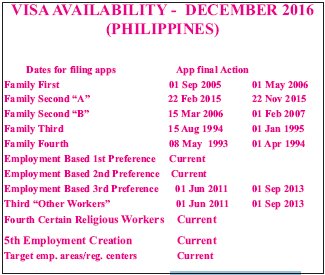
By: Robert Gard
 Following-up a proposed rule published (in the Federal Register) on May 4, 2016, and after considering all 436 comments received during the 60-day public comment period for the proposed rule, on October 24, 2016, USCIS announced a final rule adjusting (increasing) the USCIS filing fees for filing and processing most immigration applications and petitions. The new fees will be effective December 23, 2016. The final rule contains a table summarizing current and new fees. Applications and petitions postmarked or filed on or after Dec. 23 must include the new fees or USCIS will not be able to accept them.
Following-up a proposed rule published (in the Federal Register) on May 4, 2016, and after considering all 436 comments received during the 60-day public comment period for the proposed rule, on October 24, 2016, USCIS announced a final rule adjusting (increasing) the USCIS filing fees for filing and processing most immigration applications and petitions. The new fees will be effective December 23, 2016. The final rule contains a table summarizing current and new fees. Applications and petitions postmarked or filed on or after Dec. 23 must include the new fees or USCIS will not be able to accept them.
USCIS is almost entirely funded by the fees paid by applicants and petitioners for immigration benefits. The law requires USCIS to conduct fee reviews every two years to determine the funding levels necessary to administer the nation’s immigration laws, process benefit requests and provide the infrastructure needed to support those activities. Fees will increase for the first time in six years, by a weighted average of 21 percent for most applications and petitions. This increase is necessary to recover the full cost of services provided by USCIS. These include the costs associated with fraud detection and national security, customer service and case processing, and providing services without charge to refugee and asylum applicants and to other customers eligible for fee waivers or exemptions.
USCIS Director León Rodríguez noted “We are mindful of the effect fee increases have on many of the customers we serve. That’s why we decided against raising fees as recommended after the fiscal year 2012 and 2014 fee reviews. However, as an agency dependent upon users’ fees to operate, these changes are now necessary to ensure we can continue to serve our customers effectively. We will also offer a reduced filing fee for certain naturalization applicants with limited means.” While fees are increasing, processing times are also increasing. According to many immigration attorneys, there are already excessive adjudication times for applications for employment authorization, temporary visas for artists and entertainers, DACA renewals, extension of status for specialty occupation H-1B workers, and others. A lack of reliable data published by USCIS on processing times creates more confusion. Therefore, these new fees should be accompanied by a real commitment to improved processing times and better customer service.
What initially jumped out at me was:
· The Form I-526, Immigrant Petition by Alien Entrepreneur, will go from $1500 to $3675 – an increase of 145%
· The N-600, Application for Certificate of Citizenship, will go from $600 to $1,170 – an increase of 95%
· The I-601A, Application for Provisional Unlawful Presence Waiver, will go from $585 to $930 – an increase of almost 60% (and that doesn’t include the (unchanged) $85 biometrics fee)
Also the USCIS “immigrant fee” new immigrants have to pay for their green cards following consular processing will be increased from $165 to $220.
NOTES: The fee for Form I-192 will remain $585 when filed with and processed by CBP. Certain low-income naturalization applicants may pay a filing fee of $320 plus the $85 biometric services fee. For eligibility details and filing instructions, see Form I-942, Request for Reduced Fee and Form N-400, Application for Naturalization. USCIS will offer a reduced filing fee of $320 for naturalization applicants with family incomes greater than 150 percent and not more than 200 percent of the Federal Poverty Guidelines. For 2016, this means, for example, that a household of four with an income between $36,000 and $48,600 per year could pay the reduced fee. Those eligible may apply for this option using the new Form I-942, Request for Reduced Fee. The old fee for N-600/N-600K applications filed on behalf of a biological child was $600 and on behalf of an adopted child was $550. There is no fee for a Form N-600 filed by a member or veteran of any branch of the U.S. Armed Forces filing on his or her behalf.
Quick Notes:
Physical Therapists should NOT let their “Type 1” FCCPT Certificate Expire
In a recent decision, USCIS demanded FCCPT (Foreign Credentialing Commission on Physical Therapy) issue Type 1 Certificates ONLY to graduates of university programs whose diploma reads “Master’s Degree” and who have at least 202.1 credit hours. Any graduate of a program that is an academic equivalent to a US Master’s Degree will no longer be eligible to enter the US and practice Physical Therapy. In 2017, applicants will need a DPT to obtain a Type 1 Certificate.
NOTE: Type 1 Certificate renewals will not be subject to this new ruling. Renewal applications do not examine education, but only licensure and verification of English proficiency. PTs with a current Type 1 can renew the Type 1 Certificate without being subject to the new standard. However, if the Type 1 expires, the PT will have to make a new application and will be subject to the new standard. Type 1 Certificates are valid for five years from the date of issue. It’s strongly advised that PTs timely renew their Type 1 Certification so that they can continue to maintain their immigration status and their ability to work in the US.
The USCIS Policy Manual’s Newly- Released Guidance on Extreme Hardship
United States Citizenship and Immigration Services (USCIS) policy guidance in the USCIS Policy Manual on determinations of extreme hardship to qualifying relatives as required by certain statutory waiver provisions. This guidance becomes effective December 5, 2016.
Chapter 2 provides, in relevant part, that: “USCIS recognizes that at least some degree of hardship to qualifying relatives exists in most, if not all, cases in which individuals with the requisite relationships are denied admission. Importantly, to be considered the hardship must exceed that which is usual or expected. But extreme hardship need not be unique, nor is the standard as demanding as the statutory “exceptional and extremely unusual hardship” standard that is generally applicable to non-lawful permanent resident cancellation of removal.”
What are these new guidelines for?
To enter the United States or become a Lawful Permanent, most applicants must meet a list of requirements collectively called “admissibility.” If an applicant is “inadmissible,” for example, because she has a disqualifying criminal conviction or past immigration violation, she may still succeed in her application if she can show that she is eligible for a waiver of inadmissibility. Several common waivers of inadmissibility require the applicant to show that denial of the waiver would cause “extreme hardship” to the applicant’s US citizen or Lawful Permanent Resident relative. Our laws and regulations do not clearly specify what “extreme hardship” is, or how a decision maker should evaluate whether a waiver applicant has proven her case. USCIS’ updated Policy Manual explains how its officers should interpret the standard and adjudicate individual cases. For the most part, the new guidelines are not a substantial departure from previously- released information about how USCIS officers and appellate courts understand the “extreme hardship” standard.
COPYRIGHT BY AUTHOR — 2016
This article is designed to provide accurate and authoritative information in regard to the subject matter covered. It is published and distributed with the understanding that the publisher is not engaged in rendering legal, accounting or other professional service. It is submitted for publication by the author with the understanding that each individual case is different, and this article is not a formal legal opinion and should not be relied upon as advice by the author in a particular legal situation.
Mr. Gard has been engaged in the practice of immigration law since 1977. He is a frequent writer and lecturer in the American Immigration Lawyers Association and has served that professional organization as a Chapter Chair of the Greater Chicago Chapter, and as a Director. Written questions may be submitted to Mr. Gard. At his discretion, selected questions or issues may be addressed in subsequent articles. Mr. Gard is available for appointments for consultation in immigration law-related matters at the law offices of Immigration Attorneys, LLP, 203 North LaSalle Street, Suite# 1550, Chicago, Illinois 60601, Contact Information (email is the preferred method of contact): e-mail: rgard@immattyllp.com Telephone: (312) 661-9100 ext. 8943; FAX: (312) 661-9021;
Our firm has several multilingual lawyers engaged in the practice of immigration law, and also has lawyers available for criminal and civil litigation and health care facility/medical practice and licensing issues. The firm also has offices in Milwaukee (WI), Tampa (FL), and Phoenix (AZ).
 VIA Times – November 2016 Issue Vital News, Vibrant Views for Asian Americans in Chicago & Midwest
VIA Times – November 2016 Issue Vital News, Vibrant Views for Asian Americans in Chicago & Midwest

